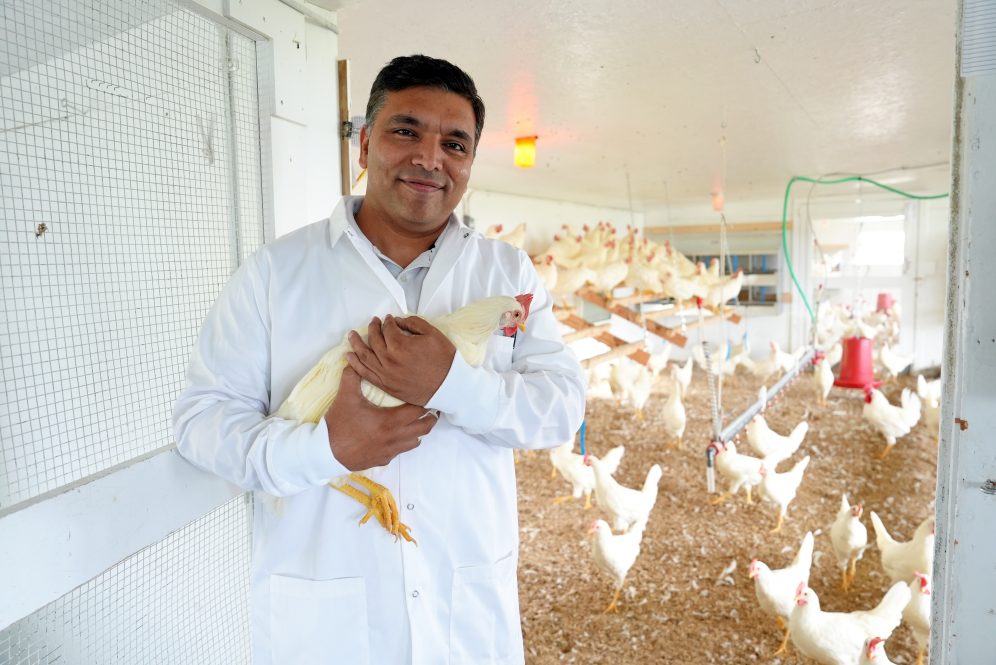'We are aiming to educate the next generation workforce to understand that food production is important but at the same time it should not come at the cost of losing our planet'

Abhinav Upadhyay, assistant professor of animal science, develops methods that help push the U.S.'s organic poultry industry forward. (Jason Sheldon/UConn Photo)
As the world's population grows, it is becoming more and more important to develop more environmentally and economically sustainable ways of producing food.
As part of an ongoing $10 million grant from the USDA, led by Kumar Venkitanarayanan, CAHNR associate dean of research and graduate education and professor of animal science, Abhinav Upadhyay, assistant professor of animal science, has developed a course to teach the next generation of agricultural workers and researchers about sustainable poultry production.
"We are aiming to educate the next generation workforce to understand that food production is important but at the same time it should not come at the cost of losing our planet," Upadhyay says.
The course is designed as a follow-up to Upadhyay's longstanding course on the fundamentals of poultry science. The new course was offered for the first time in fall 2024.
Students are introduced to the basic tenets of sustainability, why it is important, and why the scientific community is interested in making agriculture reducing the impact of agriculture on the environment now.
"In the scientific world, there is a lot of discussion as to how are we going to provide this human population with nutritious food that is also sustainable," Upadhyay says. "Because what we cannot do is have an intensive farming model where we destroy forests or don't care about the industry's implications on climate."
The course then moves into more specific information on raising poultry more sustainably and the specific challenges this industry faces in terms of human, animal, and environmental health.
For the final project in the course, students work in groups to create a proposal for their own sustainable poultry production research project.
Through this assignment, students get to experience how research proposals are actually evaluated in the professional scientific world with their peers serving as anonymized reviewers.
"These students don't have a lot of research experience," Upadhyay says. "But it was still very impressive to see how they could crosslink the ideas that were discussed in the course and then come up with a project of their own."
The course had 12 undergraduate and graduate students enrolled in the fall. It will be offered again in fall 2025. The course is open to all UConn students.
"I was happy to see that the first time we introduced this course, it has significant interest among graduate and undergraduate students," Upadhyay says.
Mackenzie Connors '25 (CAHNR) is one undergraduate student who took the course in the fall.
Connors says she valued how the course exposed her to new information not just about poultry sustainability, but also the grant writing process, even as she plans to attend veterinary school after graduation.
"It taught me a lot about sustainable poultry and also about writing grants," Mackenzie says. "For somebody who will do that in the future, that is a very, very good course. And even if you're not planning to take that career path, it's good exposure."
Upadhyay and his colleagues at Appalachian State University, University of Minnesota, and University of Arkansas published an article in Poultry Science, highlighting the course.
"The aim of the research article was to share with the entire global scientific community what we are doing," Upadhyay. "We are expecting, in the future when people read this article, they will reach out to us for potential collaborations."
Upadhyay will continue to offer the course at UConn and eventually share it with other universities as an online course. The course will be consistently updated to reflect new research and regulations related to sustainable poultry production.
"In order to develop a strong workforce in the U.S. we are developing this course and UConn is at the crux of it," Upadhyay says.
This work relates to CAHNR's Strategic Vision area focused on Ensuring a Vibrant and Sustainable Agricultural Industry and Food Supply.






